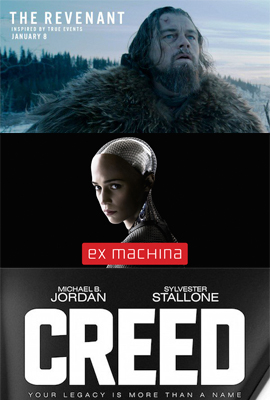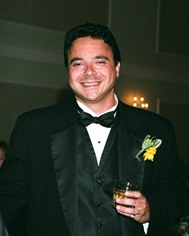 With two weeks left until the Oscars are presented on Feb. 28th, I like to focus on the films and performances that I found the most memorable. In keeping with the tradition of the late Siskel & Ebert’s “If we picked the Oscars,” here are my standouts for 2015 using the nominees in the main Academy Award categories. While others may try to second-guess Oscar politics with who ‘should win’ or ‘will win,’ I like to keep it simple. In case you missed any of them, these are the films and performances that I’ll remember most- simply put, these are the ones:
With two weeks left until the Oscars are presented on Feb. 28th, I like to focus on the films and performances that I found the most memorable. In keeping with the tradition of the late Siskel & Ebert’s “If we picked the Oscars,” here are my standouts for 2015 using the nominees in the main Academy Award categories. While others may try to second-guess Oscar politics with who ‘should win’ or ‘will win,’ I like to keep it simple. In case you missed any of them, these are the films and performances that I’ll remember most- simply put, these are the ones:
Best supporting actress: Jennifer Jason Leigh, “The Hateful Eight”
It’s not easy for an actress to impress when her first line of dialogue contains the N-word and she spends the next two hours of the film being repeatedly punched in the face by Kurt Russell, but Jason Leigh manages to do just that. In a scene showing a muted and manipulative moxie, Jason Leigh delivers the true crux of her role as Daisy Domergue in a softly-sung folk song that’s precariously plucked on an acoustic guitar. While the lyrics convey Daisy’s intentions and allow us to understand that she’s truly the most hateful of the eight assembled, it’s Jason Leigh’s acting that elevates Daisy from merely being a Joker in writer/director Quentin Tarantino’s stacked deck. In the film’s finale, with Daisy hissing venom through missing front teeth as she kneels beside dead bodies, we realize Jason Leigh is actually the Queen of this macabre melee.
Best supporting actor: Sylvester Stallone, “Creed”
Sure, it’s the sentimental vote- but when was the last time you saw the Rocky Balboa character you fell in love with from ’76? Thanks to writer/director Ryan Coogler, we were able to fall in love with the Philly fighter all over again. Through Rocky’s creator and portrayer Stallone, it was nice to discover the Italian Stallion hadn’t lost his stride. While Sly’s appearance in “Creed” could have been just a ham-handed ‘passing of the torch’ to a new generation of devotees, Coogler smartly allows Stallone to show the chinks in the armor of the underdog-cum-champion who has weathered the storm of life’s successive sequels and setbacks- most notably, in a scene where Rocky refuses medical treatment remembering his lost love, Adrian. Yo! Stallone packed a punch with a surprising blend of heartbreak and heroism.
Best adapted screenplay: Nick Hornby, “Brooklyn”
We’re drawn to classic themes we can identify with- leaving your past behind to forge a new life, effortlessly and unexpectedly finding love in the unlikeliest of places, being surrounded by friends and family who lend support and laughter, having to make life choices that put head and heart into direct conflict- and that’s just what Nick Hornby deftly juggles in adapting Colm Hoibin’s novel. In the story of Ellis (Saoirse Ronan), a girl who leaves Ireland to make a new life for herself in 1950’s New York City, her story is our story- it’s the immigrant tale that speaks to us because it’s in the very fabric of our generational tapestry. When Ellis is called back to Ireland and must choose between loyalty to family and her new life and love in America, we can appreciate Hornby’s structure of well-written dialogue and well-defined characters all the more. His métier has always been allowing the audience to see themselves in the characters he writes (as evidenced in films like “About a Boy,” “High Fidelity,” and last year’s “Wild”) and when Ellis has to grapple with the question of what defines her “home,” so do we.
Best original screenplay: Alex Garland, “Ex Machina”
“Ex Machina” was my favorite movie of 2015 thanks to an ultra-smart screenplay that combined a slick premise with a great psychological thriller. When Caleb (Domhnall Gleeson), a computer programmer, is called to his boss Nathan’s (Oscar Isaac) secluded estate/lab to see if Nathan’s new android creation Ava (Alicia Vikander) can pass for human, things get sticky. In the course of Caleb’s interviews with Ava, we find we’re caught along with Caleb in a literal and figurative web. While Ava’s clearly smarter than just a machine, has she begun to think for herself in telling Caleb not to trust Nathan? Or is Nathan programming her to test Caleb? It’s just the beginning of writer/director Garland’s masterful manipulations. In a story best described as “The Silence of the Lambs” meets “Frankenstein,” “Ex Machina” uses its sci-fi setting to its best advantage- it poses questions that make us wonder if the new technology we create can surpass our own intelligence to the point of making us all obsolete.
Best actress: Brie Larson, “Room”
What makes Larson’s acting in “Room” so special is a strength that rises above the sensational. In her role as Joy, a teenager abducted and shut away for seven years in a shed she shares with a child fathered by her captor, “Room” easily could have been the Lifetime movie from Hell. But it’s Larson’s toughness and intelligence that makes you believe the unbelievable- from planning a plausible escape from her prison to emotionally making us empathize with a woman who must wrestle with the years she’s lost against the acclimation into a world that has gone on without her. Not many actresses could pull this off, but Larson does- it’s a testament to her smarts and strength as an actor that we buy into “Room’s” scenario.
Best film: “The Revenant”- Best actor: Leonardo DiCaprio; Best director: Alejandro Gonzalez Inarritu
“The Revenant” reminded me of the best ‘70s Clint Eastwood western that Eastwood never made. The hallmarks of those westerns are all there: a quest for revenge by Hugh Glass (DiCaprio) after the murder of his son, Glass’ fight for survival in a harsh environment populated by brutal people, the culture clash between frontiersmen and Native Americans. But it’s with Inarritu’s great use of CGI effects to accentuate scenes like an epic opening battle between Pawnee Indians and fur trappers or in a fight-to-the-death scene between Glass and a grizzly bear that let you know you’re in the grip of a first-rate director’s expertly orchestrated hold. Using beautifully bleak cinematography to showcase DiCaprio’s strong and silent performance, it’s easy to see “The Revenant’s” message- how the resilience and resourcefulness of the human spirit and can shine through even the darkest of circumstances.
